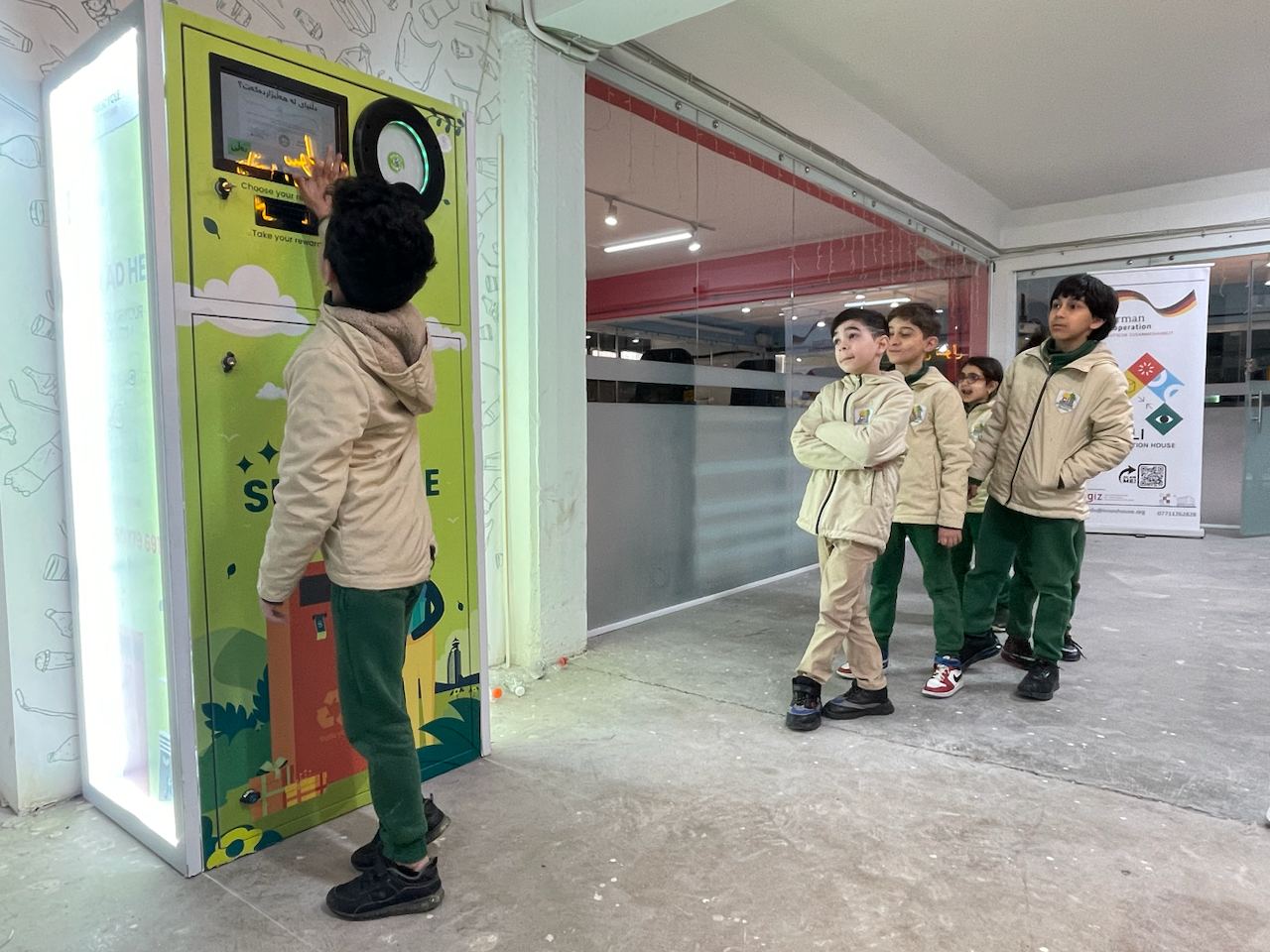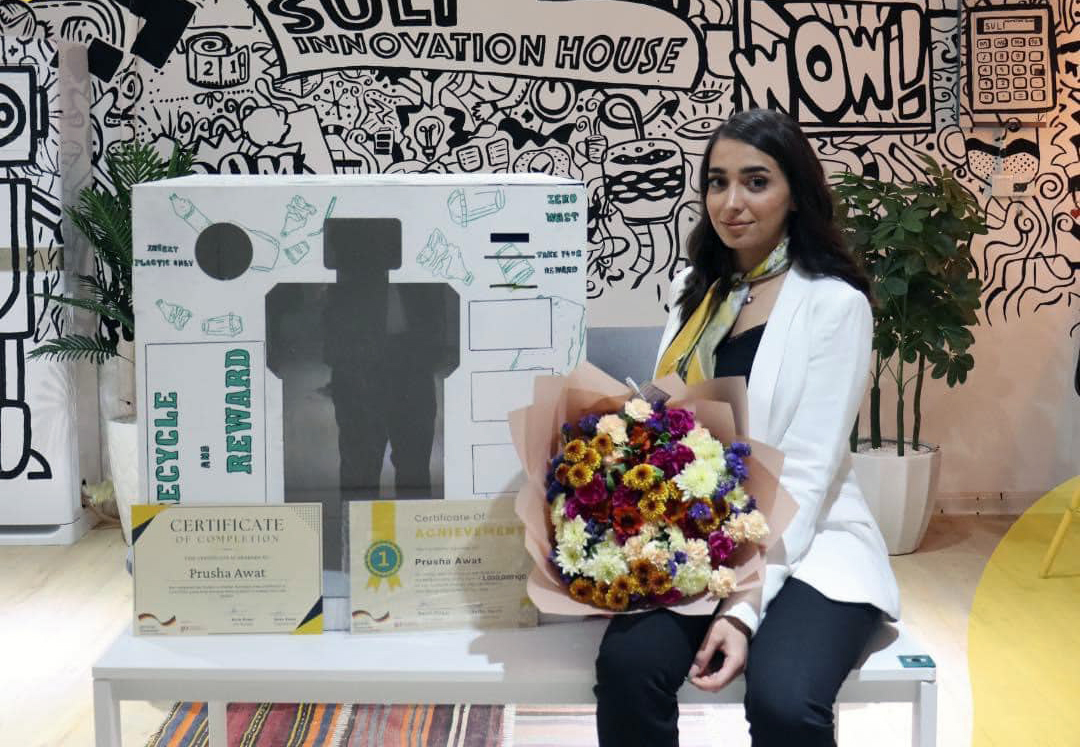Prusha Awat recently graduated from college. Unemployment and lack of experience loomed over her like icebergs. However, with some research and persistence, she found an opportunity to start an environmental project that radically changed her career and saved her from unemployment.
Prusha is an entrepreneur and the founder of SULICYCLE, a device that collects plastic waste and rewards users with shop and service discounts in and around the city of Sulaimani.
"I came up with this idea, which was my dream; some of my relatives who returned from abroad used to say, why do you throw away plastic bottles when we have devices back home that collect plastic?' I always heard these stories," Prusha recalls. The project, now over two years old, employs four people. The name of the project SULICYCLE is an abbreviation of the name of Sulaimani (SULI) and the English word (CYCLE).
The city is known as the capital of culture in the Kurdistan Region of Iraq (KRI), but the culture of waste management remains low. On average, 1,000 tons of littering is collected in Sulaimani daily, reaching 1,200 tons on special occasions, with over 60% of it being food waste.
Zardasht Rafiq, head of the media office at the Sulaimani Municipality, said that three companies are responsible for waste collection. Some of the waste is recycled, while the rest is transported to a dump site in the Tanjaro area, south of the city.
“On average, 1,000 tons of littering is collected in Sulaimani daily, reaching 1,200 tons on special occasions”
The environment has sparked months of discussion and debate between civil society and local officials. On June 5, 2024, Qubad Talabani, deputy prime minister of the Kurdistan Regional Government (KRG), wrote in an op-ed for the semi-state Iraqi newspaper Al-Sabah, that "I say without hesitation that the environmental degradation is many times greater than the danger of terrorism."
Talabani’s statement followed escalating protests against the conversion of Mount Goyzha, north of Sulaimani, into a residential complex. Despite Talabani's expression of pride and optimism over the heated discussions, his party’s security forces attacked a gathering of the “Protect Goyzha” campaign members a week later, aiming to halt the housing project.
The environmental challenge has spread throughout the entire country. According to the Central Bureau of Statistics in Iraq, the average waste generated by each citizen was 2.5 kilograms per day in 2022, totaling 11.9 million tons daily, causing significant environmental pollution. Most plastic waste in Iraq is burned, contributing to severe air pollution. According to IQAir, a Swiss air quality technology company, specializing in protection against airborne pollutants, Iraq's air is among the "most polluted" in the world.
At SULICYCLE, plastic is not mixed with other waste. “The project is eco-friendly, and even the discount coupons users receive are recycled,” Prusha said.

Iraq's air is among the "most polluted" countries in the world, IQAir.
Celebrating Women's Intelligence
Prusha’s journey began shortly after she graduated from the College of Political Science at the University of Sulaimani in 2022. She encountered opportunities that either didn’t suit her or required experience she lacked. Her future seemed uncertain until she saw a social media call for a bootcamp on "Ideas for Invention" at the Suli Innovation House.
"Making the first prototype took two months, it was very primitive. We presented our prototypes in September 2022 and ours won first place," says Prusha, 24. "We made our first model with the reward we received. It cost less than a million Iraqi dinars (USD 700)."
Youssef Amir, a hardware technician, took part in manufacturing all the device parts. "The most important function of the device is recycling and preventing environmental pollution," he proudly said.
Hemin Othman, the 23-year-old owner of Hemin Recycling, collects plastic waste from several places with a team of three, including 80 kilograms of littering the three devices of SULICYCLE. Hemin generally collects about 320 kilograms of plastic per month.
“Look, what is good about these devices is that when people see them for such a purpose, they put clean plastic into the devices,” said Othman, an electrical engineer passionate about investment. Plastic from other places is mixed with other dirt.
“What is good about these devices is that when people see them for such a purpose, they put clean plastic into the devices,”
SULICYCLE reached another milestone when its first model was showcased at the 'Tech First event in Sulaimani, where it once again ranked first. "After this step, we started receiving requests to produce the device," Prusha says. According to Amir, the device requires little maintenance. "If we get orders, we can produce a large number, but we will need more time and manpower."
Arkan Khaled Abdullah, manager of the Arkan Polyester Factory, is pleased to receive all the plastic waste Hemin Recycling collects. Arkan's factory, located in the Tanjaro, employs eight people. The plastic is recycled to produce polyester, used for making covers, pillows, and mattresses. The factory only accepts plastic labeled "PET," which stands for (Polyethylene Terephthalate), the chemical term for polyester.
Prusha has produced six devices to date, one installed inside the Culture Factory downtown, while the office of the KRG Deputy Prime Minister purchased the other five.
"It makes me very happy when people say they received discount coupons and used them, especially when children at home compete to collect the most plastic to get the discount," Prusha confidently said.

A group of children put plastic bottles in the SuliCycle device, Sulaymaniyah. Exclusively for (KirkukNow)
Get Ready for the Upcoming Model Release
Two years after launching the project, Prusha has made significant strides. People have started using the devices, new requests are coming in, and work on the updated version continues.
During our interview at the Suli Innovation House, Prusha pointed to consumers who came to use the device. Over the past six months, a total of two tons of plastic was collected by the six machines.
Sazan Qadir Hama Saleh, a journalist at the Directorate of Information, Printing, and Publishing in Sulaimani, said, "The device is wonderful because it cleans the environment of harmful plastic materials." Her son discovered the device while participating in a course at the Culture Factory. "I have been visiting this place for about two months. I have come three times and got discounts at several places. The device is economically beneficial and keeps the environment clean."
Many stores and companies participate in the project, offering discounts starting from 10%. "So far, 20 businesses are offering discounts to people who collect plastic containers," Prusha added.
“Discounts start from 10%. So far, 20 businesses are offering discounts to people who collect plastic the plastic containers"
Burger King Corporation, an American multinational chain of hamburger fast food restaurants, published on its LinkedIn page on June 5, 2024, "To further support local initiatives, we've partnered with SULICYCLE, which has launched a recycling machine. As part of this collaboration, we're excited to offer rewarding coupons to those who use the machine to recycle plastic materials.”
Ranj Ali added, "(the device) bears the name of my company. The more discounts people get; the more sales I get."
Prusha said she is also proud of the work on developing the second generation of the device. "The new device meets international standards. It can identify the type of plastic using artificial intelligence, and the user can insert two plastic bottles in one second. Devices abroad handle 32 pieces a minute, while ours can process over 60 in the same period."
Meanwhile, Hama Saleh said, "The device must be faster. Now we are forced to insert only one bottle at a time. It must be developed to insert 10 or 20 packages at once."
Besides the project's environmental benefits, Prusha said, "10% of our revenue goes to Hiwa Cancer Hospital because we consider ourselves guilty of using plastic."
Rising Above Challenges
Balancing entrepreneurship in the Iraqi context and ease is challenging. Establishing a startup like Prusha’s is no easy task. "The main problem was financial. We couldn’t develop quickly, but after interested parties came forward, we overcame this obstacle."
Ranj Ali said “Entrepreneurs face many problems. Fundraising takes a lot of your time. Sometimes it takes a whole year. You work hard to get financial support. You must invest your own money. Many give up their ideas for this reason."
Furthermore, according to Prusha, other challenges include obtaining licenses and dealing with taxes. "We are in the process of addressing these problems. We are dealing with the Chamber of Commerce. The issue is new and needs new decisions because the device is the first of its kind in Iraq."
Ali said he agreed, "Obtaining official papers is difficult. Startups and entrepreneurs must be different from opening a restaurant. More facilitations must be provided to register startups."
The Sulaimani Chamber of Commerce and Industry is aware of the project. Dr. Salam Abdullah, director general of the chamber, said he acknowledges the details of the project (SULICYCLE), pointing out the lack of a certain department dealing with such issues. "I spoke with the chairman of the Chamber, and he said they will do their best. He said he suggested to the governor of Sulaimani to form a committee from the Chamber of Commerce, the governorate administration, the municipality, and other parties to facilitate the affairs of those creating new innovations."
“You work hard to get financial support. You must invest your own money. Many give up their ideas for this reason."
"These young people need less bureaucracy to thrive and develop their potential. We proposed meeting with the youth facing similar problems to find proper solutions," Abdullah said.
"Another problem is the lack of patent rights. Other businessmen stole my business ideas and used them for themselves. No law protects the rights of startup ideas," Ali added.
Articles 16, 17, and 18 of the amended Iraqi Law No. 65 of 1970 on Patent and Industrial Designs clarify the steps for registering invention rights. Based on the law, the Ministry of Industry dispatches a committee to approve the invention before registering it.
Prusha said she believes in the project's potential to thrive further, adding "If we talk about human resources, there are very competent people who can help us. SULICYCLE is not a small project and needs government support to flourish."
Relevant local authorities have shown limited support. "We are also planning to hold a conference to discuss youth problems," said Abdullah.
Prusha is pioneering a new path for young entrepreneurs. She is now continuing her studies in the Computer Science Department at the University of Sulaimani to further develop her business.
"Very soon, everyone in (the Kurdistan Region) will be integral to addressing the challenge of environmental protection.” She said she is confident that the SULICYCLE will continue to grow.





